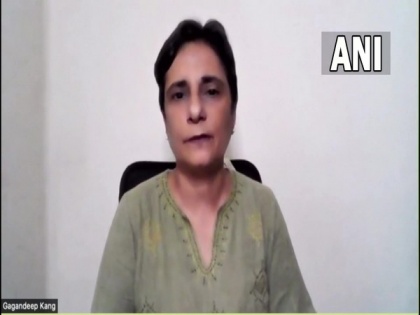Study on feasibility of mixing COVID-19 vaccine doses to be available by February: Dr Gagandeep Kang
By ANI | Published: December 31, 2021 10:29 PM2021-12-31T22:29:21+5:302021-12-31T22:40:02+5:30
The effectiveness of heterologous vaccine doses against new COVID-19 variants is likely to come in six weeks after the trial in the Christian Medical College, Vellore, said top virologist, Dr Gagandeep Kang, on Friday.

Study on feasibility of mixing COVID-19 vaccine doses to be available by February: Dr Gagandeep Kang
The effectiveness of heterologous vaccine doses against new COVID-19 variants is likely to come in six weeks after the trial in the Christian Medical College, Vellore, said top virologist, Dr Gagandeep Kang, on Friday.
In an interview with ANI, Dr Kang, who is a professor at CMC Vellore, said, "The study on the mixing of Vaccines doses is expected to be finished in 6 weeks. I hope that we will be able to finish recruitment for the study in the next couple of weeks, which means that the results will be available in about six weeks. CMC Vellore is currently doing the study, but when you do a clinical trial it takes time to recruit participants, and then to vaccinate them. It is then that we turn to really develop an antibody response and then study that antibody response."
She further said that the study is delayed because of not getting enough participants who received two jabs of Covaxin.
"When the study first started, it was being done only in Vellore and it was difficult to find enough participants who had received two doses of Covaxin and were willing to participate in a clinical trial. We are now reaching out to my colleague Professor Wensley Rose who leads the study and has reached out to a number of people in other places where there are more people who have received Covaxin," Dr Kang noted.
On booster dose as an option for India in reference to some studies she said, "As an Indian scientist, I can say that there is very little data available to inform a decision on which vaccines should be used as a booster dose in India. If we look at Covishield, there is a similar study, boosting study that has been done in the UK, where it has been shown that the third dose of Covishield increases the antibody response by 3.25 times and if you give a third dose."
She further said, "It appears clear that antibodies are not the only things that protect against severe infection and disease.The T cell responses are maintained even when antibodies decline. So we don't know whether all our decisions should be based only on antibodies."
In the interview, Dr Kang also discussed about mRNA booster and said, "If you look at the same study and what results they got with mRNA, they showed a 24 times increase in antibodies. So there does seem to be a difference in different vaccines, giving different levels of boosting of antibodies."
On Covaxin as booster she said,"When it comes to Covaxin, we have no data because the studies have not been done as yet. If we look at other inactivated vaccines, then those results are not really comparable because the phase three results of Covaxin and the phase three results of other inactivated vaccines, Covaxin seemed better than other inactivated vaccines. So we really need to evaluate Covaxin with the same and different vaccines as boosters before we make a decision."
( With inputs from ANI )
Disclaimer: This post has been auto-published from an agency feed without any modifications to the text and has not been reviewed by an editor
Open in app